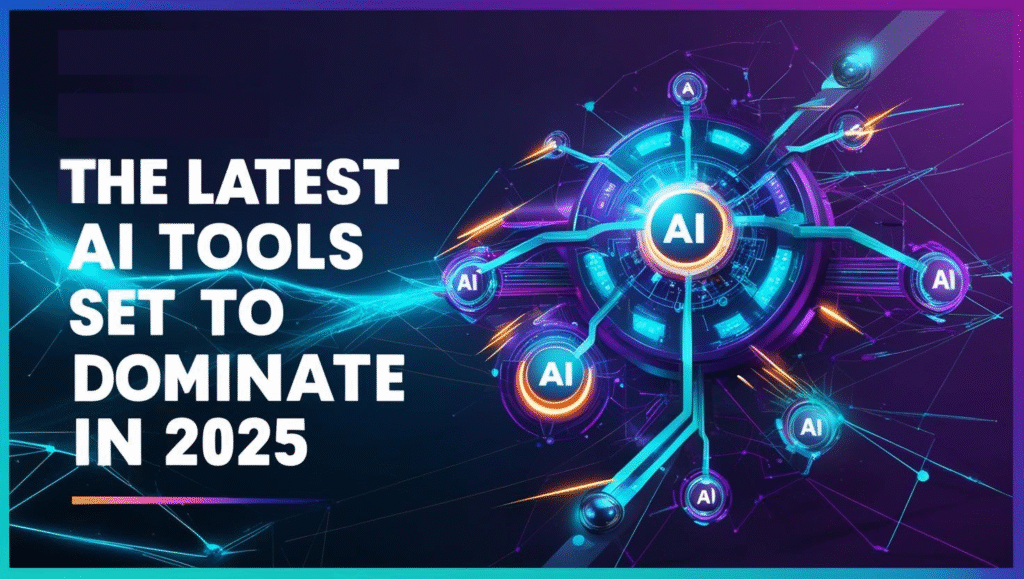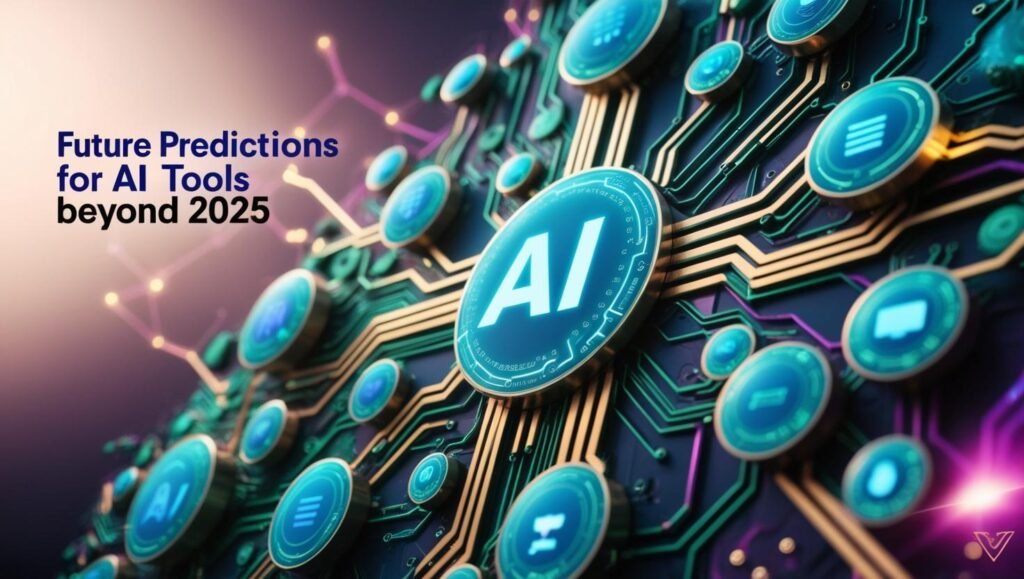The Latest AI Tools Set to Dominate in 2025

As we stand on the brink of 2025, the world of artificial intelligence is poised for a seismic shift. Innovators and tech enthusiasts alike are eagerly anticipating the arrival of cutting-edge AI tools that promise to redefine our approaches to problem-solving, creativity, and efficiency.
From advanced machine learning algorithms to intuitive chatbots, these emerging technologies are set to transform industries, enhance user experiences, and unlock unprecedented opportunities.
Embracing these tools not only means staying ahead in the competitive landscape but also leveraging AI to create smarter, more responsive applications. In this article, we’ll explore the latest ai tools in 2025, analyzing their potential impact and how they can propel businesses and individuals toward greater success.
Whether you’re a business leader or a tech aficionado, understanding these innovations is essential for navigating the future landscape shaped by AI. Join us as we uncover the tools that will reshape our digital reality in the coming years.
Key Trends Shaping AI Development in 2025
As we move into 2025, several key trends are fundamentally shaping the landscape of artificial intelligence. One of the most significant trends is the evolution of machine learning algorithms. These algorithms are becoming increasingly sophisticated, with enhanced capabilities for pattern recognition, natural language processing, and predictive analytics.
The development of these advanced algorithms is driven by the growing availability of big data and the need for more precise and actionable insights across various applications, from healthcare to finance.
Another critical trend is the rise of edge computing in AI. Edge computing brings computation closer to the data source, reducing latency and enabling real-time processing. This trend is particularly important for applications requiring immediate responses, such as autonomous vehicles and smart home devices.
By integrating AI at the edge, these systems can operate more efficiently and effectively without relying on cloud-based processing, which can be slower and less reliable.
Additionally, the democratization of AI is transforming the landscape. With the advent of user-friendly AI platforms and tools, businesses of all sizes can now harness the power of artificial intelligence. This democratization is lowering the barrier to entry, allowing startups and smaller enterprises to compete with larger corporations.
As a result, we are witnessing a surge in innovative AI applications across a wide array of industries, each leveraging AI to solve unique challenges and create new opportunities.
Latest AI Tools in 2025
AI continues to accelerate across industries, and 2025 promises even more groundbreaking tools. Here are 10 of the most innovative AI tools that are set to redefine workflows, creativity, and security in the year ahead:
1. GPT-4 by OpenAI
- The latest evolution in large language models.
- Powers advanced text generation, content creation, customer service, and data analysis.
- Known for its human-like fluency and deep contextual understanding.
2. Canva AI
- An AI-driven design assistant built into Canva.
- Suggests templates, layouts, and visuals based on user intent.
- Ideal for marketers, social media creators, and non-designers seeking fast, polished visuals.
3. Darktrace
- AI-powered cybersecurity platform.
- Detects and responds to cyber threats autonomously in real-time.
- Learns from emerging threats to continually improve its defense mechanisms.
4. Runway ML
- An AI-powered video and image editing platform.
- Offers generative tools for background removal, motion tracking, and content synthesis.
- Perfect for creatives, marketers, and content creators.
5. Jasper AI
- A top-tier AI writing assistant for marketing and SEO copy.
- Produces blog posts, ad copy, emails, and product descriptions in seconds.
- Used widely by content teams and agencies for scaling up content production.
6. Synthesia
- AI video generation tool using avatars and synthetic voices.
- Allows users to create professional videos without cameras or actors.
- Ideal for corporate training, product demos, and educational content.
7. Copy.ai
- Automates content writing with an easy-to-use interface.
- Great for generating blog ideas, headlines, product descriptions, and more.
- Speeds up the ideation process for marketers and business owners.
8. Fireflies.ai
- AI-powered meeting assistant that transcribes, summarizes, and analyzes calls.
- Seamlessly integrates with Zoom, Google Meet, and Microsoft Teams.
- Useful for professionals looking to stay organized and save time.
9. ChatGPT Team or Enterprise
- A secure, collaborative AI assistant built for teams.
- Includes custom GPTs and workspace integration for business productivity.
- Ideal for scaling internal knowledge, automating workflows, and enhancing collaboration.
10. Notion AI
- Embedded AI assistant within Notion’s workspace app.
- Assists with writing, brainstorming, summarizing, and project planning.
- Empowers individuals and teams to increase productivity and clarity.
How AI Tools Are Transforming Industries

The transformative power of AI tools is being felt across various industries, driving innovation and efficiency. In the healthcare sector, AI tools are revolutionizing diagnostics and patient care.
For instance, AI-powered imaging systems can analyze medical scans with remarkable accuracy, identifying anomalies that may be missed by human eyes. These tools not only enhance diagnostic precision but also expedite the process, allowing for timely interventions and improved patient outcomes.
In the financial industry, AI is streamlining operations and enhancing decision-making processes. AI-driven algorithms are used to analyze vast amounts of financial data, predicting market trends and identifying investment opportunities.
Additionally, AI tools are automating routine tasks such as fraud detection, risk assessment, and customer service, freeing up human resources for more strategic activities. This increased efficiency and insight are enabling financial institutions to better serve their clients and stay competitive in a fast-paced market.
Retail is another sector experiencing significant transformation due to AI. Personalized shopping experiences are becoming the norm, thanks to AI tools that analyze consumer behavior and preferences. These tools can recommend products, optimize pricing strategies, and manage inventory with greater precision.
Retailers are also leveraging AI-powered chatbots to enhance customer service, providing instant responses to inquiries and resolving issues promptly. This level of personalization and efficiency is driving customer satisfaction and loyalty, ultimately boosting sales and profitability.
The Role of AI in Enhancing Productivity
AI tools are playing a crucial role in enhancing productivity across various domains. One of the most impactful areas is automation. By automating repetitive and time-consuming tasks, AI allows employees to focus on more strategic and creative activities.
For example, AI-powered software can handle data entry, scheduling, and other administrative tasks, significantly reducing the workload on human resources. This not only improves efficiency but also enhances job satisfaction by enabling employees to engage in more meaningful work.
Collaboration tools powered by AI are also boosting productivity by facilitating seamless communication and project management. Platforms like Slack and Microsoft Teams are integrating AI features to enhance user experience.
These features include intelligent scheduling assistants, automated meeting summaries, and real-time language translation, which streamline workflows and improve team collaboration. By minimizing communication barriers and ensuring that everyone is on the same page, these tools enable teams to work more cohesively and efficiently.
Furthermore, AI is enhancing decision-making processes by providing actionable insights derived from data analysis. Tools like Tableau and Power BI use AI to analyze complex data sets and generate visualizations that highlight key trends and patterns.
This level of insight allows businesses to make informed decisions quickly, optimizing operations and strategy. By leveraging AI-powered analytics, organizations can identify opportunities for improvement, mitigate risks, and drive innovation.
Integrating AI Tools into Your Business Strategy

Integrating AI tools into your business strategy can drive significant value, but it requires careful planning and execution. The first step is to identify the specific needs and challenges that AI can address within your organization. This involves conducting a thorough analysis of your operations, customer interactions, and market conditions.
By understanding where AI can have the most impact, you can prioritize the adoption of tools that align with your strategic goals.
Once you have identified the areas where AI can add value, the next step is to select the right tools. This involves evaluating various AI solutions based on their capabilities, ease of integration, and cost-effectiveness. It is important to choose tools that are scalable and flexible, allowing for future growth and adaptation.
Additionally, consider the level of support and training provided by the vendor, as this can significantly impact the successful implementation and utilization of the tool.
Implementing AI tools also requires a cultural shift within the organization. Employees need to be educated about the benefits of AI and how it can enhance their work. Providing training and resources to help staff understand and use AI tools effectively is crucial.
It is also important to foster an environment that encourages innovation and experimentation, allowing employees to explore new ways of leveraging AI to improve processes and outcomes. By integrating AI into the fabric of your business, you can unlock new levels of efficiency and innovation.
Case Studies: Successful Implementation of AI Tools
Several organizations have successfully implemented AI tools, demonstrating the potential benefits and best practices. One notable example is the healthcare provider, Mayo Clinic. By integrating AI-powered diagnostic tools, Mayo Clinic has significantly improved the accuracy and speed of medical diagnoses.
These tools analyze patient data, medical histories, and imaging results to provide physicians with actionable insights. As a result, patient outcomes have improved, and the efficiency of the diagnostic process has increased.
Another successful case study is the multinational technology company, IBM. IBM has leveraged AI to enhance its customer service operations through the implementation of Watson, an AI-powered chatbot. Watson interacts with customers, resolving inquiries and issues with high accuracy and speed.
This has not only improved customer satisfaction but also reduced the workload on human customer service representatives, allowing them to focus on more complex and high-value tasks. The success of Watson has led to its adoption by other organizations seeking to optimize their customer service operations.
The retail giant, Amazon, provides another compelling example of AI implementation. Amazon uses AI to personalize the shopping experience for its customers. By analyzing browsing and purchasing behavior, AI algorithms recommend products tailored to each customer’s preferences.
This level of personalization has driven higher engagement and sales. Additionally, Amazon employs AI for inventory management and logistics, optimizing stock levels and delivery routes to ensure timely and efficient order fulfillment. These AI-driven strategies have solidified Amazon’s position as a leader in the retail industry.
Future Predictions for AI Tools Beyond 2025

Looking beyond 2025, the future of AI tools promises even more groundbreaking advancements. One prediction is the rise of AI-powered creativity. As AI continues to evolve, we can expect to see tools that can compose music, create visual art, and write literature with a high degree of originality and sophistication.
These tools will not only assist human creators but also push the boundaries of what is possible in the realm of artistic expression.
Another exciting development is the integration of AI with augmented reality (AR) and virtual reality (VR). This convergence will create immersive and interactive experiences that can be used in various fields, from education and training to entertainment and retail. AI will enhance these experiences by providing real-time data analysis and personalization, making AR and VR applications more engaging and effective.
Additionally, the advancement of quantum computing will have a profound impact on AI. Quantum computers can process information at unprecedented speeds, enabling the development of more powerful and complex AI algorithms. This will open up new possibilities for solving problems that were previously intractable, such as drug discovery, climate modeling, and cryptography. As quantum computing becomes more accessible, we can expect to see a new wave of AI innovations that will transform industries and society as a whole.
Conclusion:
As we stand on the cusp of 2025, the AI revolution is well underway, with new tools and technologies poised to reshape our world. From advanced machine learning algorithms to AI-powered design platforms and cybersecurity solutions, the latest developments in AI offer unprecedented opportunities for innovation and efficiency.
By understanding and embracing these tools, businesses and individuals can stay ahead in the competitive landscape, leveraging AI to create smarter, more responsive applications.
The transformative impact of AI is evident across various industries, enhancing productivity, driving innovation, and improving outcomes. However, it is essential to address the ethical considerations associated with AI development, ensuring fairness, transparency, and privacy. By integrating AI tools thoughtfully and strategically, organizations can unlock new levels of value and drive sustainable growth.
As we look to the future, the potential of AI is limitless. With continued advancements in AI-powered creativity, AR/VR integration, and quantum computing, the possibilities are boundless.
Embracing the AI revolution means not only staying ahead of the curve but also contributing to a future where technology enhances our lives in profound and meaningful ways. The journey is just beginning, and the future of AI holds exciting prospects for all.
For the latest insights and updates, be sure to explore our AI Trends & News and stay ahead in the world of artificial intelligence.

Pingback: o4‑mini: AI Reasoning and Automation - AI insights world
Pingback: Grok 3 Review: The Fast, Bold AI Assistant - AI insights world